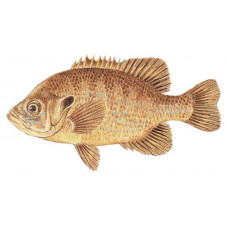Latin name
Lepomis cyanellus
Other names
Green perch, black perch, pond perch, creek perch, sand bass, bluespotted sunfish, rubbertail.Identification
Description
The green sunfish has a slender, thick body, a fairly long snout, and a large mouth with the upper jaw protruding below the pupil of the eye. It is similar to the warmouth and smallmouth bass. It has short, rounded pectoral fins, fused dorsal fins, and an enlarged gill cover or "earlobe" that is black with a light red, pink, or yellow edge. The body is usually brown to olive or bluish-green with a bronze or emerald-green sheen, turning yellow-green on the underside and yellow or white on the belly. Adults have a large black spot on the back of the base of the second dorsal and anal fins, and breeding males have yellow or orange borders on the second dorsal, caudal, and anal fins.
Distribution
In North America, green sunfish are found from New York and Ontario through the Great Lakes, Hudson Bay and Mississippi River basins to Minnesota and South Dakota and south to the Gulf of Mexico. They are also found from the Escambia River in Florida and Mobile Bay in Georgia and Alabama to the Rio Grande in Texas and northern Mexico.
Habitat
Green Sunfish prefer warm, still waters and backwaters of slow moving streams, as well as ponds and small shallow lakes. They are often found near vegetation, but have been known to establish territories near the water's edge under shrubs, rocks, or exposed roots. They often become stunted in ponds.
Size
The average length is 4 inches, usually ranging from 2 to 8 inches and reaching a maximum of 12 inches, which is extremely rare. Most weigh less than half a pound. The world record for all tackle is considered to be a 2 pound 2 ounce fish caught in Missouri in 1971.
Life history and Behavior
This species becomes sexually mature at 2 years of age and spawns from April to August when water temperatures range from 68° to 84°F. Males build saucer-shaped nests in water usually less than 1 foot deep, often in areas protected by rocks or logs. Yellow, sticky eggs are guarded by the male until they hatch 3-5 days later. Green sunfish spawn at the same time as other Lepomis species, and hybridization is not uncommon.
Food and feeding habits
Green Sunfish prefer dragonfly and mayfly nymphs, caddisfly larvae, midges, freshwater shrimp, bugs, and will occasionally eat small fish and mosquitoes.
Reproduction
No information
| Classification | |
| Phylum | Chordata |
| Class | Actinopterygii |
| Squad | Perciformes |
| Family | Centrarchidae |
| Genus | Lepomis |
| Species | L. cyanellus |
| Features | |
| Conservation status | Least Concern |
| Habitat | Littoral |
| Life span, years | No information |
| Maximum body weight, kg | 0.96 |
| Maximum length, cm | 30 |
| Sailing speed, m/s | No information |
| Threat to people | Edible |
| Way of eating | Bentophage |



